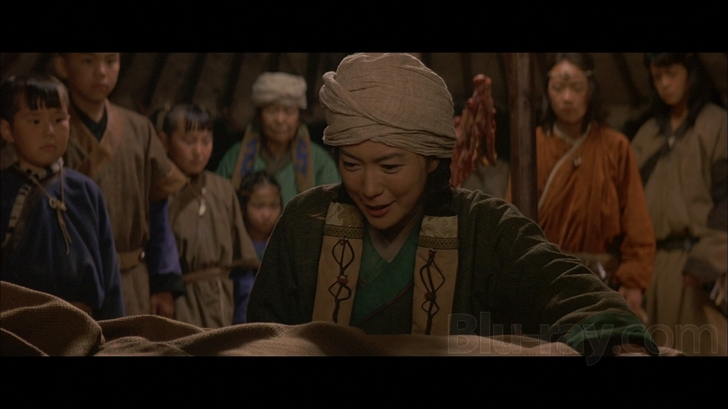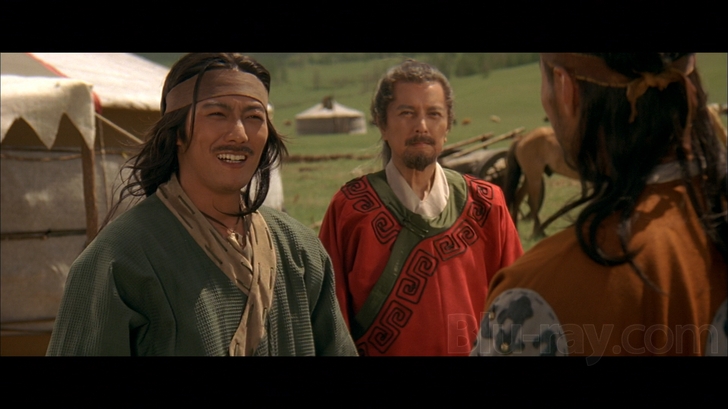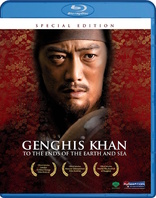Genghis Khan: To the Ends of the Earth and Sea Blu-ray Movie
HomeGenghis Khan: To the Ends of the Earth and Sea Blu-ray Movie 
Aoki Ôkami: chi hate umi tsukiru madeFUNimation Entertainment | 2007 | 136 min | Rated R | Apr 21, 2009
Movie rating
6.4 | / 10 |
Blu-ray rating
| Users | 3.2 | |
| Reviewer | 3.5 | |
| Overall | 3.5 |
Overview
Genghis Khan: To the Ends of the Earth and Sea (2007)
After 27 years of planning, Genghis Khan: To the Ends of the Earth and Sea finally captures the mystery and majesty of one of history's greatest rulers - Genghis Khan. this landmark achievement of Japanese cinema represents an epic undertaking not soon to be rivaled. Genghis Khan: The name is a legend. The man...Near myth. A soul obscured by his own achievements; Son, husband, father, conqueror. Genghis Khan: To the Ends of the Earth and Sea weaves the saga of one exalted man's march towards immortality and the battle to unite the tribes of Mongol under one rule.
Starring: Takashi Sorimachi, Rei Kikukawa, Mayumi Wakamura, Yoshihiko Hakamada, Eugene NomuraDirector: Shin'ichirô Sawai
| Foreign | Uncertain |
| Action | Uncertain |
| Drama | Uncertain |
| History | Uncertain |
| War | Uncertain |
| Adventure | Uncertain |
Specifications
Video
Video codec: MPEG-4 AVC
Video resolution: 1080p
Aspect ratio: 2.39:1
Original aspect ratio: 2.39:1
Audio
Japanese: Dolby TrueHD 6.1
English: Dolby Digital 2.0
Subtitles
English
Discs
50GB Blu-ray Disc
Single disc (1 BD)
Playback
Region A (C untested)
Review
Rating summary
| Movie | 3.5 | |
| Video | 4.5 | |
| Audio | 4.5 | |
| Extras | 3.0 | |
| Overall | 3.5 |
Genghis Khan: To the Ends of the Earth and Sea Blu-ray Movie Review
Wait a minute. . .isn't Genghis Khan supposed to be a bad guy?
Reviewed by Jeffrey Kauffman August 8, 2011Think of the great villains of all time and then of the cultures which spawned them. Had there been films around in days of yore, could you imagine the Huns making Attila or the Carthaginians producing Hannibal? Of course in relatively recent times we’ve seen those actually able to make a film lionize such dastardly people as Hitler and Stalin, all in the name of national pride. It’s fascinating to think, then, that for some people the name Genghis Khan doesn’t automatically plop into the “villain column,” and that he is indeed seen as a unifying force and a basically good guy, despite his penchant for conquering and pillaging. This joint Japanese-Mongolian production (made to commemorate the 800th anniversary of the founding of Mongolia) tends to dwell on the relatively kinder, gentler side of its iconic titular hero, providing a wealth of backstory with which most Westerners at least probably won’t be all that familiar. The film actually eschews most of Genghis Khan’s territorial invasions, stopping right before that period of his life begins, and instead attempts to focus on what made Khan the great ruler and military tactician that he inarguably was. Genghis Khan tends to be one of those names with which most people are at least passingly familiar, but about whom very little is actually known. To those ends, Genghis Khan: To the Ends of the Earth and Sea can be seen as a sort of latter day Eastern parallel to those big budget late 1950’s and early 1960’s historical epics like El Cid which sought to humanize their subjects while providing a bit of historical perspective. Like the Western productions, Khan may not in fact be completely historically accurate, but it’s often incredibly visceral and gives a Western audience a peek behind the curtain of a culture which literally helped shape the modern world. It also makes for a really interesting companion piece to Mongol, another film covering much the same territory but perhaps not quite so cavalier in crafting its hero as basically a nice guy who just might have slaughtered countless innocents.

Westerners of course have attempted to craft historical epics out of all sorts of non-Western characters, from Joseph L. Mankiewicz’s gargantuan Cleopatra to Oliver Stone’s more recent Alexander. There are actually some analogs to both of these films, and many others of their general ilk, and Khan. Khan covers decades of its title hero's life, unfolding the slow growth of a man who would conquer much of the known world against a personal story of Khan (called Temujin for the bulk of the film) attempting to come to terms with his sort of “half-breed” status, something that indeed gives some psychological impetus to his desire to unite warring Mongol factions. While both of these elements are handled in a visually sweeping manner, including some unbelievably majestic location work in Mongolia itself, there’s a none too subtle aspect to the film’s exploration of Temujin’s quest to figure out whose son he actually is, something that is evidently hoped gives the outing some emotional weight.
Genghis Khan: To the Ends of the Earth and Sea begins with his mother (the character in fact narrates the entire film), a young woman who is a member of the Merkit tribe, and who in the opening scenes of the film is abducted by the rival Mongol tribe shortly after her marriage to a Merkit chieftain. Within a few months, she's pregnant, with some question as to whether the baby is the result of her brief time with her Merkit husband or with her new abductor Mongol one. This dialectic plays out not only in the Mongol population at large, but also within Temujin's family itself, leading to some tragic consequences for one of Temujin's brothers. The film takes this basic idea and slathers on a bit of hyperbolic irony years later when Temujin's own bride is abducted by the Merkit and is recaptured months later, pregnant herself. “What’s sauce for the goose” plays out in some relatively unexpected ways in this subplot, though it’s so conveniently synchronistic that it strains credulity at the very least. And as laudable as these attempts are in revealing the warring factions that Khan supposedly wanted to merge into one, the whole mirroring plot conceit seem heavy handed. While this approach perhaps helps to humanize a figure who is often relegated to the ranks shared by Attila and Hitler, mindless thugs who fought their way to glory with nary a thought for the consequences, Khan probably swings the pendulum a bit too far in the humanizing direction, positing its hero as a well meaning, if flawed, visionary who was willing to sacrifice a few (OK, quite a few) innocents in order to achieve the dream of worldwide unity.
This film took decades to finally see the light of day, but it was done on a relatively paltry budget for a film of this epic sweep. The good news is production values are almost all very high, with really sumptuous costumes and sets, and some very well staged battle scenes with lots (and lots) of horses. Some of the CGI augmentation of huge hordes of soldiers don’t exactly rise to Industrial Light and Magic levels, but they manage to help evoke the large scale feel the film is obviously aiming for. The overall film has a really majestic sweep and alluring visual element courtesy of director Shinichirô Sawai. And while no one would ever claim that historical epics of this sort aren’t usually hobbled by stiff performances, when taken within the context of this genre, the actors in Genghis Khan: To the Ends of the Earth and Sea actually come off rather well, with believability and even some occasional emotional nuance. (Make sure to stick with the original Japanese language track, as the English dub voice work is beyond lamentable).
Some may feel that the film’s decision to end its fairly lengthy two hour and fifteen minute running time right at the brink of Khan’s first overwhelming battle victory storming the Great Wall of China robs the project of what is arguably its greatest opportunity at epic filmmaking. While that may be true, it also points out the real motive that the film’s creators in making Genghis Khan: To the Ends of the Earth and Sea: they weren’t attempting to give a full life retrospective of their hero. Instead, this is a film trying to dig beneath the surface of a famous character who has become, for better or worse, nothing much more than a name or symbol. While the film might be faulted for trying to recast Genghis Khan as a visionary leader while more or less ignoring his more ignoble elements, the film is a bracing look at a culture at a crossroads, seen through the prism of a defining individual who not only shaped that culture itself, but cast a large shadow on the entire Eastern region for centuries afterward.
Genghis Khan: To the Ends of the Earth and Sea Blu-ray Movie, Video Quality 

Genghis Khan: To the Ends of the Earth and Sea is presented on Blu-ray with an AVC encoded 1080p transfer in 2.39:1. For the most part, this is a spectacular looking film, though strangely the exterior locations sometimes don't pop with the same vivacity that the interior scenes do. While colors on costumes as well as fleshtones are extremely well saturated and gorgeously varied, often times the actual countryside seems strangely desaturated by comparison. Larger displays will point up the less than state of the art nature of some of the CGI. Sharpness and clarity, as well as fine detail, are excellent to superb throughout this presentation, though there is edge enhancement clearly visible in a number of exterior shots, especially when backlighting is evident where sky meets land.
Genghis Khan: To the Ends of the Earth and Sea Blu-ray Movie, Audio Quality 

When a foreign language film is presented with both its original language track and an English dub, results can either be surprisingly good, mixed, or lamentable. In the case of Genghis Khan: To the Ends of the Earth and Sea, there is absolutely no contest on a variety of criteria. The lossless Japanese Dolby TrueHD 6.1 track not only completely outclasses the lossy Dolby Digital 2.0 English dub on fidelity and immersion, the English dub features such hopeless voice actors that it's best listened to for some good laughs. The Dolby TrueHD 6.1 mix is extremely varied, with excellent directionality and a variety of surround effects, including everything from nicely whipping sounds of arrows piercing through the air to nice panning of horses' hooves across the steppes of Asia. Dialogue is very well presented and it, as well as sound effects and score, are extremely well mixed. There is a very odd and anomalous pop song which plays over the end credits that seems completely out of place, and which includes the timeless lyric "You are a wolf and I am love."
Genghis Khan: To the Ends of the Earth and Sea Blu-ray Movie, Special Features and Extras 

- Filming Journal (SD; 42:57) is an exhaustive multi-part look at the filming of Genghis Khan: To the Ends of the Earth and Sea. Copious location footage is shown, including lots of on-scene interviews with the multi-lingual cast and crew.
- Peek Behind the Scenes (SD; 4:18) is a brief look at the cast and crw departing buses and trucks and setting up a scene.
- Great Plains of Mongolia (SD; 9:48) is a nice music video-esque look at some of the most picturesque scenery in the film, set to a nice if sparse piano score.
- Premiere on Stage Greetings (SD; 15:56) features the principal cast and director greeting the audience at the premiere.
- Premiere Screenings (SD; 33:42) offers red carpet (actually blue carpet, maybe it's a cultural thing) footage as well as interviews taking place at the Mongolia and Hong Kong premieres of the film.
- Uncut Battle Scenes (SD; 32:12) includes extended versions of several key battle sequences in the film.
- Original TV Spots (SD; 5:02)
Genghis Khan: To the Ends of the Earth and Sea Blu-ray Movie, Overall Score and Recommendation 

Genghis Khan: To the Ends of the Earth and Sea is a big sweeping historical epic that may bring to mind similar films about iconic heroes which were a staple of Hollywood roadshow attractions in the late 1950's and early 1960's. If it's odd to think of Genghis Khan as a "hero," it's important to place this film in the context of the Eastern filmmakers who made it and the audiences for whom it was made. If this rendition of the early life of Khan tends to whitewash some of the more sordid aspects of this conqueror, it still manages to invest a character who is more often than not a name or a symbol with a little real life. Visually impressive, even if its CGI elements are a little lacking, this is a large scale effort that still manages to focus on individuals within an epochal series of events. Recommended.
Similar titles
Similar titles you might also like

Red Cliff: Part I & Part II
赤壁 / 赤壁:决战天下 | Chi Bi | Original International Version
2008

My Way
마이웨이 / Mai Wei
2011

Assembly
Jí Jié Hào
2007

Red Cliff II
Red Cliff Part II / Chinese Theatrical Version
2009

1911
Xinhai geming
2011

Master and Commander: The Far Side of the World 4K
2003

Warriors of Heaven and Earth
天地英雄
2003

The Warlords
Tau ming chong
2007

Arn: The Knight Templar - The Complete Series
Tempelriddaren + Riket vid vägens slut
2007

The Flowers of War
金陵十三钗 / 金陵十三釵 / Jīnlíng Shísān Chāi
2011

Das Boot
The Director's Cut | Single-Disc Edition
1981

The Great Battle
안시성 / Ansi-seong
2018

Legend of the Black Scorpion
夜宴 / The Banquet / Ye Yan
2006

9th Company
9 rota | Collector's Edition
2005

Tora! Tora! Tora!
1970

Back to 1942
一九四二 / Yi jiu si er
2012

13 Assassins
Jûsan-nin no shikaku
2010

White Vengeance
鴻門宴
2011

Operation Red Sea
红海行动 / Hong hai xing dong
2018

Mongol: The Rise of Genghis Khan
2007
